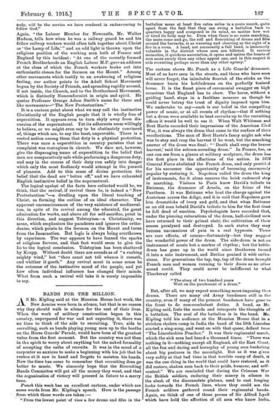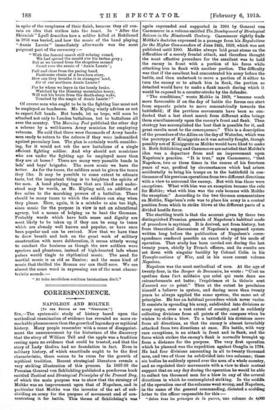BANDS FOR. THE MILLION.
t S Mr. Kipling said at the Mansion House last week, the 11 New Armies were born in silence, but that is no reason why they should walk in silence for the rest of their lives. When the work of military construction began in this country, unprepared for war and not expecting it, there was no time to think of the aide to recruiting. True, aide to recruiting, such as bands playing young men up to the booths on the Horse Guards' Parade, would have been of the greatest value from the first moment. But the country was not then in the spirit to worry about anything but the naked formality of accepting the oaths of recruits. It was in the mood of a carpenter so anxious to make a beginning with his job that he rushes at it saw in hand and forgets to moisten hie hands. Now the time has come to remember that recruiting does go better to music. We sincerely hope that the Recruiting Bands Committee will get all the money they want, and that the organization of victory will proceed in future to a merry tune.
Punch this week has an excellent cartoon, under which are some words from Mr. Kipting's speech. Here is the passage from which those words are taken
"From the lowest point- of view a few drums and fifes in the- he battalion battalion mean at least five extra miles in a route march, quite apart from the fact that they can swing a battalion back to quarters happy and composed in its mind, no matter how not or tired its body may be. Even when there is no route marching, the mere come and go, the roll and flourishing of drums and fifes around the barracks, is as warming and cheering as the sight of a fire in a room. A band, not necessarily a full band, is immensely valuable in the district where men are billeted. It revives memories, it quickens association, it opens and unites the hearts of men more surely than any other appeal can, and in this respect it aids recruiting perhaps more than any other agency."
The cartoon shows Mr. Punch as a Life Guards' drummer. Most of us have seen in the streets, and those who have seen will never forget, the inimitable flourish of the sticks as the drummer beats his kettledrums on the perfectly trained horse. It is the finest piece of ceremonial swagger on high occasions that England has to show. The horse, without a guiding hand, steps in a faultless measure as though be could never betray the tenet of dignity imposed upon him. We undertake to say—such is our belief in the compelling power of music, or at all events of rhythm—that if nothing but a drum were available to beat recruits up to the recruiting offices it would be well to use it. When Walt Whitman and Bret Harts recorded their impressions of the American Civil War, it was always the drum that came to the surface of their recollections. The man of Bret Harte's fancy might ask who was to stay and reap the harvest if he went, but the searching answer of the drum was final: " ' Death shall reap the braver harvest,' said the solemn-sounding drum." In France, too, aa one can see from a glance at military sculpture, the drum has the first place in the affections of the nation. In 1879 General Farre abolished the French drum, and only provided for his successor the opportunity of becoming enormously popular by restoring it. Napoleon called the drum the king of instruments, for it alone ensures the brisk cadenced step in marching. Visitors to Paris know David's tribute to Estienne, the drummer of Arcola, on the frieze of the Pantheon. It was Eetienne who beat the charge against the Austrians across the Adige, and it is said that Napoleon guys him drumsticks of ivory and gold, and that when Estienue as an old man beheld David's tribute to him for the first time he fell dead of emotion. Psychologists have recorded that, under the piercing reiterations of the drum, half-civilized men have returned to their primal state, the cultivation of their senses paralysed and destroyed. In such states they may become unconscious of pain in a real hypnosis. Those are rare effects, of course—fortunately—but they suggest the wonderful power of the drum. The side-drum is not au instrument of music, but a marker of rhythm ; but the kettle- drum has gone up in the world since Beethoven turned it into a solo instrument, and Berlioz praised it with enthu- siasm. For generations the tap, tap, tap of the drum brought French men and women running to their doors as no other sound could. They could never be indifferent to what Thackeray called
"The story of two hundred years Writ on the parchment of a drum."
But, after all, we may expect something more imposing than drums. There are many old Army bandsmen still in the country, even if many of the present bandsmen have gone 10 the front to do non-combatant duties. A band, as Mr. Kipling said, feels the moods and interprets the thoughts of a battalion. The soul of the battalion is in the band. Mc Kipling told his audience at the Mansion House that in a stricken cholera camp in India the band of the 10th Lincoln. started a sing-song, and went on with that queer, defiant tune "The Lincolnshire Poacher." It was their regimental march, which the sick men had heard a thousand times. "There was nothing in it—nothing except all England, all the East Coast, all the fun and daring and horseplay of young men bucketing about big pastures in the moonlight. But as it was given very softly at that bad time in that terrible camp of death, it was the one thing in the world that could have restored, as it did restore, shaken men back to their pride, humour, and self- control." We are reminded that during the Crimean War the British soldiers, enduring their misery in silence in the slush of the disconsolate plateau, used to cast longing looks towards the French lines, where they could see the French soldiers gathered round their regimental baud.. Again, we think of one of those poems of Sir Alfred Lyall which have held the affection of all men who know India, in spite of the roughness of their finish, because they all con- tain an idea that strikes into the heart. In " After the Skirmish " Lyall describes how a soldier killed at Rohilcund in 1858 was buried, and bow the music of the band playing "Annie Laurie" immediately afterwards was the most poignant part of the ceremony:— "With the funeral march still echoing round,
We had spread the mould o'er his tartan gory ; But as wo turned from the shapeless mound Sweet rose the music of ' Annie Laurie '; Full and clear from the pacing band, Passionate strain of is love-lorn story, How can they breathe it in strangers' land, Air of our northern Annie Laurie ?
For he whom wo leave in the lonely brake,
Watched by the Ilimalay mountains hoary, Will not his brain from the death-sleep wake, Touched by the magic of Annie Laurie ?"
Of course men who ought to be in the fighting line must not be employed as bandsmen, Mr. Kipling wisely advises us not to expect full bands. But bands, let us hope, will soon be attached not only to London battalions, but to battalions all over the country. The Morning Post published the other day a scheme by a well-known Army musician for employing veterans. He said that there were thousands of Army bands- men ready to return to the colours if they were indemnified against pecuniary loss. The plan is certainly worth consider- ing, for it would not rob the new battalions of a single efficient fighting soldier. And why should not musicians who are under the fighting age be employed more than they are at home P There are many very passable bands in lads' and boys' brigades. The more music we have the better. As for the tunes, the soldiers must be given the tunes they like. It may be possible to some extent to educate taste, but the important thing is to heighten the spirits of the men. A band playing tunes that are liked and under- stood may be worth, as Mr. Kipling said, an addition of five miles to the marching powers of a battalion. There should be many tunes to which the soldiers can sing when they please. Here, again, it is a mistake to aim too high, since music for the purpose in view ie not an educational agency, but a means of helping us to beat the Germans. Probably words which have both sense and dignity are most likely to be taken up if they can be sung to tunes which are already well known and popular, or have once been popular and can be revived. Now that we have time to draw breath and look on the great work of military construction with more deliberation, it seems utterly wrong to conduct the business as though the new soldiers were epeetree and phantoms, instead of high-hearted lads whose pulses would tingle to rhythmical music. The need for martial music is as old as Duthie; and the same kind of music that thrilled the Roman ear can thrill ours. We use almost the same word in expressing one of the most charac- teristic sounds
"At tuba terribilem sonittun taratantara







































 Previous page
Previous page